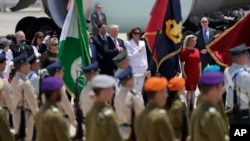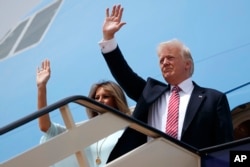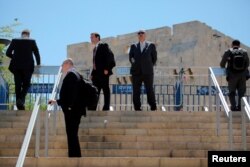U.S. President Donald Trump arrived Monday in Israel, making his first visit there as a president who wants to revive the effort to achieve a long-sought peace agreement between Israel and the Palestinians.
Trump's travel from Riyadh to Tel Aviv was historic, with Air Force One completing the first direct flight between the two countries.
Israeli Prime Minister Benjamin Netanyahu and President Reuven Rivlin were among those gathered for a welcome ceremony at Ben-Gurion Airport.
Trump's schedule Monday includes meetings with both leaders, as well as a visit to the Western Wall, an important Jewish holy site. On Tuesday, Trump has talks scheduled with Palestinian President Mahmoud Abbas.
Trump said in March that an Israeli-Palestinian peace deal is "maybe not as difficult as people have thought," though he has not given any indication of how he might approach the issue differently. He has tasked his son-in-law and senior advisor Jared Kushner with leading the effort for the White House.
Trump said during his campaign for president that the best way to negotiate an agreement is taking what he called an "objective" approach to the serious and extremely emotional issues keeping both sides apart. But he has said continued Israeli settlements do not help the peace process, and has backed off his promise to move the U.S. Embassy from Tel Aviv to Jerusalem.
The last peace negotiations broke down in 2014.
Trump's first overseas stop as president was in Saudi Arabia, where on Sunday he called for Muslim unity in the fight against terrorism and called it "a battle between good and evil."
He spoke at a gathering of dozens of Arab and Muslim leaders at a regional summit in Riyadh, telling them the U.S. wants a coalition of nations "who share the aim of stamping out extremism.
"This is not a battle between different faiths, different sects, or different civilizations," Trump said. "This is a battle between barbaric criminals who seek to obliterate human life, and decent people of all religions who seek to protect it."
Trump, who is seeking to impose a travel ban for people from six majority-Muslim countries, did not use the contentious phrase "radical Islamic terrorism" as he frequently has in speeches at home. Instead, he called on the Muslim leaders to honestly confront "the crisis of Islamist extremism and the Islamist terror groups it inspires."
Trump singled out Iran, a rival of U.S. ally Saudi Arabia, accusing Tehran of contributing to instability in the region.
"From Lebanon to Iraq to Yemen, Iran funds, arms and trains terrorists, militias and other extremist groups that spread destruction and chaos across the region," Trump said.
Trump said battling terrorism "means standing together against the murder of innocent Muslims, the oppression of women, the persecution of Jews, and the slaughter of Christians. Religious leaders must make this absolutely clear: Barbarism will deliver you no glory – piety to evil will bring you no dignity."
The speech drew polite applause for about 20 seconds but there was no standing ovation except from the U.S. official delegation.
Jocelyne Cesari, who focuses on Islam and world politics at Georgetown University's Berkley Center for Religion, Peace and World Affairs, said the language used by Trump in his speech was a "clear departure from his domestic" remarks on Islam.
"He has never made this difference that he made in this speech between Islamist radical ideology and Islam as such...but what it will mean in terms of policy and implementation is not clear," she said.
Trump's speech was a surprising turn for the president in the wake of his “America First” rhetoric and campaign statements calling for a total Muslim travel ban, which he then softened to call for a more limited travel ban from the six Muslim-majority countries. His effort has been blocked by U.S. courts, although Trump is appealing the ruling.
Saudi Arabia is an unprecedented destination for an initial overseas visit by any U.S. president, but the oil-rich nation, which has deep, long-standing energy and defense ties to the United States, was not included in Trump's travel ban edict.
On Saturday, Saudi King Salman bin Abdulaziz and Trump signed a nearly $110 billion agreement to bolster the military capabilities of Saudi Arabia.







